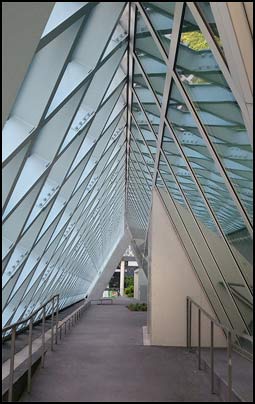
When the Democratic convention took over Charlotte, NC, one of the preparations was the closing of the downtown public library for a week. The public library is one of the great American institutions. The library has also turned out, in many cities, to be a focal point for the conflict between homeless and housed citizens. In Madison, WI, the main library is such a popular hangout, people experiencing homelessness always know where to find their friends.
This summer, in Gloucester, MA, exasperated library employees told Nancy Gaines about the problems they experienced with homeless patrons — not all, but maybe 10%-15%. The staff faced an ever-changing stream of challenges, and two or three police visits a day, interspersed with the occasional ambulance. The city’s homeless shelter was, of course, only open at night. Several churches stepped up, on a rotating basis, to provide a space for people to exist during the daylight hours.
Bethlehem, PA, instituted new policies last year to strictly prohibit many activities, such as washing up in the restrooms and sleeping. In fact, it’s even against the rules to bring a sleeping bag inside. The situation had been dicey for some time, but reached critical mass when a van started dropping off a group of homeless people every day. The library maintains that its function is not to be an adult day care center, and it is correct in that. But everybody’s got to be somewhere.
Last winter, word came from Atlanta, GA, that not dozens, but hundreds of people experiencing homelessness were hanging out at the libraries every day. In Lubbock, TX, the architecture of the main library became a problem because people were using the partially protected space as a shelter, an urban cave dwelling.
The same thing happened in Fort Collins, CO. A new main public library was built in 1974, with overhanging sections all around, that were originally filled with substantial bushes. When the economy started to slide, people stored their belongings, and sometimes themselves, among the foliage. Eventually, all the big bushes were uprooted and much skimpier and lower plants were installed.
Seattle, WA, made news in 2009 when it became the first library system to hire an outreach worker. At one point, the library was spending over $300,000 a year on services and security relating to homelessness. Last month, when the Seattle’s public library system ran out of money and shut down for more than a week, journalist Matt Driscoll asked, “Where Do the Homeless Go When the Library Is Closed?” More people showed up at the Urban Rest Stop, a center with shower and laundry facilities, which was already operating at peak capacity.
Another agency, Compass Housing, which offers a number of amenities, also had increased traffic. Normally, Driscoll says:
While there are rules and security measures in place designed to keep the Central Library from becoming a full-on shelter, it’s commonplace for the homeless to seek refuge at computer terminals and amidst the stacks during foul weather – or even just to pass the time until real homeless shelters open in the evening.
At one point, the satirical publication The Onion ran an article stating:
In addition to the destitute citizens who have long sought shelter here, the ongoing recession has forced hundreds of newly homeless Americans to seek refuge among the library’s shelves.
The headline read, “Census Finds Enough Homeless People Living In Public Library To Warrant Congressional District.” When you can’t tell the difference between satire and reality, a society is in real trouble. On the other hand, what an opportunity this central gathering place offers, for engaging people and bringing them into the community, rather than pushing them farther into the margins. Where political activism is concerned, the popularity of the public library among people experiencing homelessness has a definite upside. It’s a great place to register voters, and put a dent in the disenfranchisement that is spreading through America like a plague. In fact, why not designate all libraries as polling places?
In Petaluma, CA, the situation improved in the spring when the town’s soup kitchen was relocated. E. A Barrera interviewed librarian Doug Cisney, who described problems like drunkenness and fighting which have now decreased. In all fairness, the librarian also said most of the homeless library users are well-behaved and considerate, even helping clean up the surrounding landscape. Cisney is quoted:
I can ban an individual from the library if it is determined that person is disturbing others. We have very clear policies that make soliciting, begging, dressing inappropriately — as in bare feet, bare chests, disturbing outfits — and excessive problems with body odor or decorum unacceptable. But you have to use that power with good judgment. A person’s excessive use of cologne or perfume can be as unpleasant as someone who has not showered in a week.
Good point.
Reactions?
Source: “’Homeless’ visitors posing issues for library,” GloucesterTimes.com, 06/18/12
Source: “Homeless patrons prompt Bethlehem Area Public Library’s behavior policy,” LehighValleyLive.com
Source: “Where Do the Homeless Go When the Library Is Closed?,” SeattleWeekly.com, 08/31/12
Source: “Census Finds Enough Homeless People Living In Public Library To Warrant Congressional District,” The Onion, 12/22/10
Source: “Homeless no longer a problem at library,” Petaluma360.com, 04/06/12
Image by moyix (Brendan Dolan-Gavitt).


